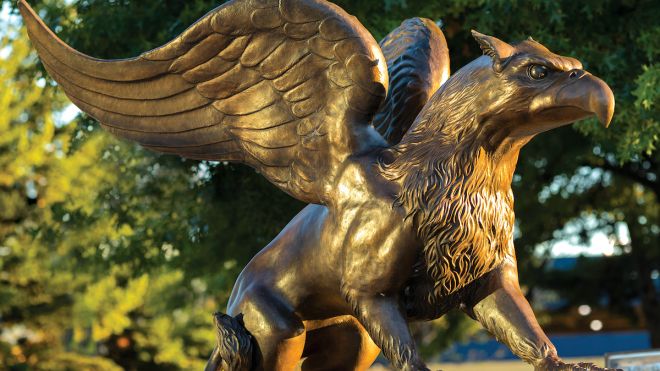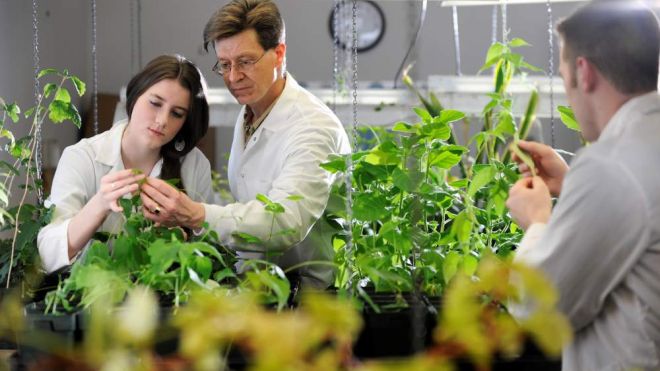
Buffalo, NY - Some of the best advice Steve Stoute ever received came from his father.
“He liked to say, ‘Seek first to understand, then to be understood,’” Stoute recalls. “Those words resonated and therefore I always endeavor first to listen.”
Canisius University’s freshly inaugurated 25th president has been doing a lot of listening since he arrived on campus July 1. What he has heard so far is heartening.
“People have spoken so glowingly about their Canisius experience and how transformative their education was in their lives,” Stoute recounts. “Those stories provide tremendous perspective about the importance of the institution to the people of this city, this region, and to those around the state and the country.”
As he reaches the half-way point of his freshman year at Canisius, expect Stoute to lean heavily into the transformative power of higher education – particularly Catholic higher education.
For him, it’s personal.
Stoute was born and raised in Trinidad and Tobago. The dual-island Caribbean nation sits off the coast of Venezuela and is home to a small population of Catholics (about one-third). His parents, Steve and Joanne Stoute, instilled in him a deep faith. The first of four children, Stoute was educated in the Catholic tradition, from middle school through high school. Not surprisingly, Catholic college followed.
“For my parents, going to an American Catholic college was critically important,” Stoute says. “Their faith in Catholic education changed the trajectory of my life, for our family and for every successive generation.”
Stoute immigrated to the United States at age 19 to attend Seton Hall, a private, Catholic university near Newark, NJ, where he played Division I soccer. He was the first to leave home, the first to leave the country and the first in his family to attend college. Once the culture shock subsided, Stoute thrived in his new environment.
“I chose Seton because it was Catholic and because it was in an urban environment, which afforded plenty of experiential learning opportunities connected to the city, and the business and civic communities,” he says.
The distinctiveness of being Catholic and urban are predominantly what attracted Stoute to Canisius University – and the president’s position.
He learned of the school’s search for a president while in his fourth year as chief of staff and vice president for strategic initiatives at Chicago’s DePaul University. In these roles, Stoute interfaced with nearly every institutional division including academic affairs, advancement, enrollment management, finance and athletics. When Covid-19 hit in March 2020, Stoute helped lead the nation’s largest Catholic university through its transition to online learning and spearheaded new student support initiatives.
“Steve already had all the experience and skills necessary to be a college president,” says Stoute’s former boss and mentor DePaul President Emeritus A. Gabriel Esteban, PhD. “But his leadership during the pandemic made him beyond ready to take the next step and I encouraged him to do so.”
Stoute actually knew by junior year at Seton Hall that he wanted a career in higher education. His aspirations, however, centered on becoming an athletic director, largely due to his positive student-athlete experience. It was not until 2005 when Stoute returned to serve on the university’s governing board that he began to seriously consider the idea of becoming a college president.
“At first I didn’t say it out loud,” laughs Stoute, who sat on the board’s Finance, Student Affairs and Academic Affairs committees, among others. “But the more I began to understand all that goes into creating opportunities for students to change and transform their lives, the more earnest I became about the idea of being a president at an institution of higher learning.”
Stoute spent the next several years immersed in all facets of higher education, beginning with administrative roles in athletics at the University of Southern California. He then returned to New Jersey where he spent three years at Princeton University working in alumni relations and development. While there, Stoute also became a quick study in strategic communications, community relations, alumni relations, donor engagement and development. The next step in his career, earning a terminal degree at the University of Pennsylvania Carey Law School.
“I went to law school not intending to practice law but to further my career in higher education,” Stoute explains. “I wanted the training; to learn how to process large quantities of information, distill it, understand what is important, and to be able to make sound, reasonable, evidence-based decisions and apply them in a higher education environment.”
Stoute earned his juris doctor and joined the Philadelphia law firm of Dechert LLP, where he specialized in corporate and securities matters. He had four years invested when his longstanding friend and mentor – and newly-appointed president of DePaul University - offered Stoute a homecoming in higher education.
“It wasn’t a difficult sell,” laughs Esteban. “I knew Steve from his days at Seton Hall. His Catholic education gave him his start and was transformative for him. He always wanted to give back in a way that would do the same for others.”
It is from this perspective that an energized President Stoute plans to lead Canisius University into the future.
“We need to evolve in how we think about being a higher education institution,” says Stoute, who is the first person of color to lead Canisius and, at age 41, one of the youngest.
Though not determinative of his leadership, these traits “do influence how I think about the world, our place in it, and our obligation to educate students who see the needs of their communities and understand their responsibility to create a better society for all.”
Stoute expounded on this concept of quintessential servant-leadership in his October 22 inaugural address before an audience of more than 500.
“Consider,” he said, “the multiple crises we face in our society which, in many ways, are existential.” Among them, economic, environmental, social and racial. They are challenges unlike those at the turn of the century or at any other point in human history. Yet, they are not insurmountable. “And because we are Catholic, Jesuit and urban,” continued Stoute, “Canisius is uniquely positioned to RISE to meet this moment.”
In classrooms, residence halls, athletic spaces and everywhere in between, Stoute called upon the Canisius community to Renew its commitment to justice; Inspire a new generation of leaders who challenge the status quo; Serve every person with love; and Empower others to act the same.
“Canisius has always been the place where leaders are made. Now, we have an opportunity and an obligation to transform a new generation of students into leaders; leaders who can ask the critical questions, understand people and their perspectives, and articulate how to achieve positive outcomes. When we do this, Canisius University will be a force for justice and together, we all will rise,” Stoute concludes.
To be successful, Canisius will heed the early advice of Stoute’s father and seek first to understand, then to be understood.
Seton Hall University
BS, Business
University of North Carolina at Chapel Hill
MS, Sports & Exercise
University of Pennsylvania Carey Law School
JD, Law



